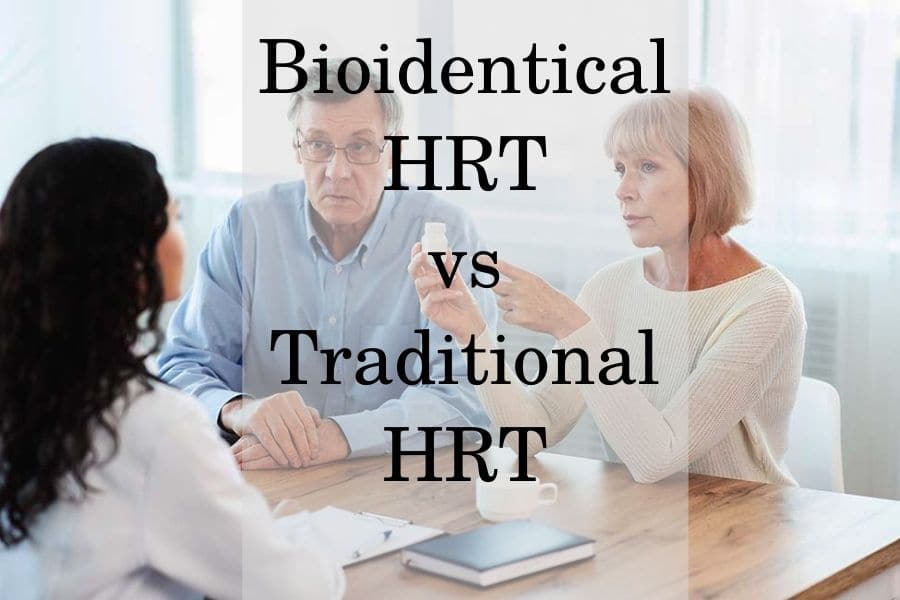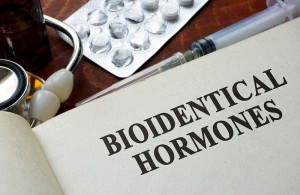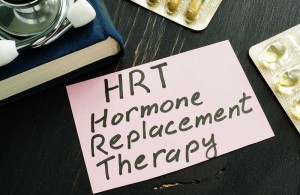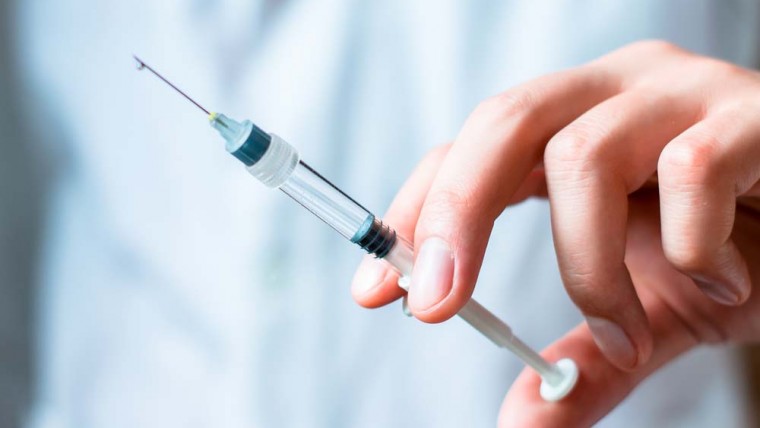In this article
When it comes to hormonal therapies (HRT) there is a ton of conflicting information on whether “bioidentical” or “synthetic” products are the better options.
Bioidentical indicates that the molecular structure of the hormone is indistinguishable from the one naturally produced in the human body. They are usually produced from natural sources.
Synthetic is a term describing hormones produced from chemical resources. Unfortunately, certain pharmacies and clinics take advantage of the fact that most patients perceive “natural” medications as safer options.
Bioidentical hormones are commonly marketed as more natural, even though these products still require chemical processing
Furthermore, patients are often misled to believe that regular HRT necessarily contains synthetic hormones and bioidentical ones are always the better option.
Therefore, they promote compounded bioidentical hormones (cBHRT) derived from natural products as alternatives to regular HRT.
In reality, cBHRT products are custom-made in the pharmacy and lack the quality or safety control of FDA-approved medications. This makes them potentially dangerous for your health.
However, doctors associated with the pharmacy may recommend cBHRT since it’s more profitable for them than prescribing regular HRT.
What are bioidentical hormones?
Bioidentical hormones are derived from natural products, such as soy and yams. However, studies reveal that these plants do not contain the actual hormones but precursors, which your body can’t transform on its own.
Therefore, these plants still need chemical processing before the ingredients are transformed into bioidentical hormones such as dehydroepiandrosterone (DHEA), estriol (estrogen), progesterone, and testosterone (T).
More on the topic: Can red light therapy boost testosterone?
Most of these hormones, except progesterone, are not approved by the FDA for use in women. Purchasing FDA-approved progesterone requires a medical prescription.
Scientists report that FDA-approved progesterone BHRT products also adopt the name “body-identical” to avoid confusion with compounded bioidentical hormones (cBHRT). They are available for oral or intravaginal application.
Nevertheless, other BHRT are also promoted by compounding pharmacies as medications for menopausal women.
Compounded BHRT are custom-made in pharmacies, rather than manufactured by licensed drug companies. They are not subject to the same rigorous quality standards and there is no guarantee for their safety or effectiveness.
Many cBHRT are marketed as supplements, and purchasing them doesn’t require a prescription. They come in oral, transdermal, and intravaginal forms.
Some pharmacies promote these hormones as anti-aging products, even though there is no evidence to support such claims.
The dosage of cBHRT is often based on a hormonal saliva test, which is not a reliable method for assessing your hormonal status.
Therefore, there is a higher risk for inappropriate dosage and side effects, especially with oral forms of bioidentical estrogen which are not FDA-approved.
What are synthetic hormones?
Synthetic hormones approved for HRT include progestins (synthetic progesterone-like steroids), synthetic conjugated estrogens, and testosterone esters.
They are either completely synthetic or produced from the hormones found in the urine of pregnant animals.
Synthetic estrogens and progestins are prescription medications, which are FDA-approved for the management of signs and symptoms in women related to menopause.
They are available in various forms including oral capsules, dermal and vaginal gels, skin and buccal patches, nasal sprays, and intramuscular injections.
Synthetic estrogens and progestins have well-known side effects in women which are outlined in the Summary of Product Characteristics of every medication.
For example, oral forms of estrogen may increase the risk of venous thromboembolism (VTE) and breast cancer.
However, studies report that other forms such as transdermal estrogen do not increase the risk of VTE or malignancies. Therefore, it is much more commonly prescribed compared to oral formulations.
On the other hand, progestins may increase the risk of breast cancer, VTE, and cardiovascular diseases.
There’re 3 testosterone esters approved for the treatment of low T in men. Testosterone is available as pellets, pills, gels, patches, and injections.
Possible side effects in men include infertility, acne, oily skin, prostate hypertrophy, and increased red blood cell count.
Difference between HGH and Testosterone
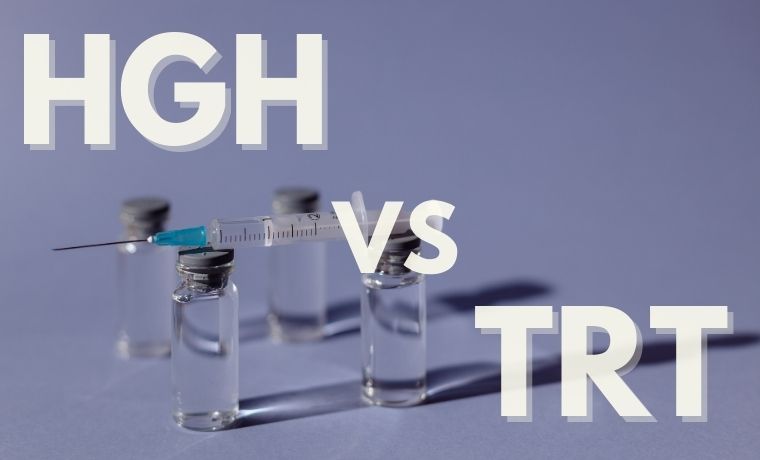
Despite the fact that growth hormone and testosterone have completely different structures and secretions, there is a complex interaction between the effects of the two hormones.
Are bioidentical hormones safer?
BHRT products are often perceived as safer by patients for several reasons:
- often marketed as “natural” products
- commonly endorsed by the compounding pharmacies that produce them as well as associated clinics and experts
- despite having similar adverse effect potential as regular HRT, pharmacies
- do not add the same safety warning in the Summary of Product Characteristics for cBHRT
However, studies reveal that there is a lack of scientific evidence to support the safety and effectiveness of BHRT. Therefore, most of these products are not FDA-approved.
The preliminary evidence suggests that the side effects of bioidentical hormones are likely similar to those of synthetic ones.
However, cBHRT use carries additional risks. Many of these products come as supplements, which lack the enforced safety standards in prescription medications.
Due to the lack of control over compounded bioidentical hormones, they are much more likely to get overdosed, underdosed, or contaminated.
Scientists report that there have been cases of fatal infections due to contamination with pathogens that occurred in the compounding pharmacies.
In order to receive safe and effective HRT, make sure to visit a qualified medical doctor such as an endocrinologist.
A specialist will first diagnose you using reliable blood tests and determine whether you need treatment or not. HRT is recommended and prescribed only to people with medical indications such as symptoms due to menopause, hormonal deficiencies, etc.
What’s the difference between BHRT and HRT?
Marketers associated with compounding pharmacies promote cBHRT as a safer and more effective form of treatment than regular FDA-approved HRT.
However, there are a number of facts and scientific studies which contradict these claims.
Efficacy and absorption
Bioidentical progesterone is significantly less effective than synthetic progestins. Compounded bioidentical progesterone is usually in the form of creams or gels which have poor transdermal absorption.
There are FDA-approved body-identical progesterone products but their half-life is quite short, which is why synthetic progestins are more commonly prescribed for therapy in menopausal women.
Bioidentical testosterone is also less effective than its synthetic counterpart. The esterification of synthetic T allows for better absorption and bioavailability when compared to bioidentical testosterone. Bioidentical T is not approved by the FDA for therapy in hypogonadism.
Furthermore, the extraction from a natural product can lead to significant variabilities in compounded bioidentical testosterone which makes it significantly less reliable compared to regular TRT.
Safety and side effects
Bioidentical estrogen products have a potentially higher risk of side effects than synthetic ones. That’s because cBHRT often comes in oral forms which are known to increase the risk of venous thromboembolism. Currently, there are no FDA-approved bioidentical estrogens.
On the other hand, synthetic estrogens are regulated products, commonly prescribed as transdermal creams, patches, and vaginal gels which carry a lower risk of adverse reactions.
Synthetic progestins may have an increased risk of side effects than FDA-approved progestins. Preliminary studies suggest that body-identical progesterone may have a more favorable safety profile.
Yet, there are no randomized trials to ultimately prove that body-identical progesterone is safer or more effective.
Furthermore, compounded bioidentical progesterone products are often produced as gels or creams which are rather ineffective due to the poor transdermal absorption of progesterone.


